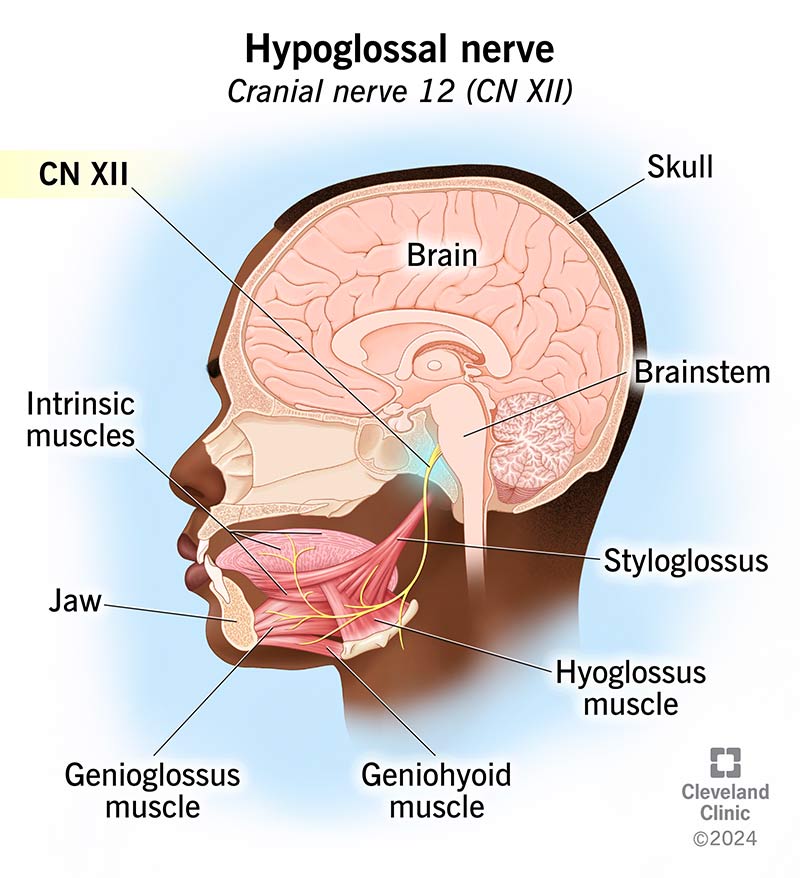Your hypoglossal nerve enables tongue movement. It controls your hyoglossus, intrinsic, genioglossus and styloglossus muscles. These muscles help you speak, swallow and move substances around in your mouth. Certain health conditions can affect your hypoglossal nerve function, but there are ways you can prevent some of them.
Advertisement
Cleveland Clinic is a non-profit academic medical center. Advertising on our site helps support our mission. We do not endorse non-Cleveland Clinic products or services. Policy

Image content: This image is available to view online.
View image online (https://my.clevelandclinic.org/-/scassets/images/org/health/articles/hypoglossal-nerve)
Your hypoglossal nerve is one of your 12 paired cranial nerves. Your hypoglossal nerve starts at the base of your brain. It travels down your neck and branches out, ending at the base and underside of your tongue. Its name comes from the Greek words “hypo,” which means under, and “glossal,” which means tongue.
Advertisement
Cleveland Clinic is a non-profit academic medical center. Advertising on our site helps support our mission. We do not endorse non-Cleveland Clinic products or services. Policy
Your hypoglossal nerve is a motor nerve that carries signals to and from your brain to control muscle movement.
Other names for your hypoglossal nerve include:
Your hypoglossal nerve controls muscles that move your tongue, allowing you to:
Your hypoglossal nerve controls your:
Your hypoglossal nerve starts in the base of your brain near the top of your spinal cord (brainstem).
Before reaching your tongue, it:
Advertisement
Any of the following conditions may affect hypoglossal nerve function:
If you have hypoglossal nerve damage, your tongue weakens on the side that’s affected. It will eventually waste away (atrophy), leading to paralysis of your tongue. Because of this, you may have trouble swallowing, chewing and/or speaking.
Damage due to ALS can lead to subtle, tiny twitching movements (fasciculations) on the surface of your tongue.
If you have sudden pain along with any of these symptoms, you may have a dissected internal carotid artery.
To test for hypoglossal nerve stimulation, your healthcare provider may ask you to protrude your tongue. Hypoglossal nerve damage usually only affects one side of your tongue. When you stick your tongue out, it may point to the damaged side. Your provider may also ask you to push your tongue against your cheek while feeling for pressure on the opposite side.
Your provider may also order certain tests, including:
Treatment for hypoglossal nerve damage depends on the cause. Your healthcare provider will discuss this with you. For example, treatment for ALS may include medications and therapies to manage your symptoms and slow down the progression of the disease. Treatment for head and neck cancer may include surgery, radiation therapy and/or chemotherapy.
Advertisement
Hypoglossal nerve issues can impact your ability to eat, speak or swallow. Some causes, like trauma and surgical complications, can be difficult to avoid. Seeing an experienced surgeon if you need a mouth or throat procedure may lower your risk.
Taking care of yourself can help you avoid disruption to hypoglossal nerve function. These efforts include:
Call a healthcare provider if you experience issues on one or both sides of your tongue.
These may include:
You may not think about your hypoglossal nerve much. But it’s an important part of your anatomy. It helps you move your tongue. It allows you to speak, swallow and push substances around in your mouth. Conditions affecting hypoglossal nerve function include stroke, cancer and ALS. You can help protect your hypoglossal nerve from some of these conditions by leading a lifestyle that’s healthy for you. Talk to a healthcare provider if you develop any symptoms affecting your hypoglossal nerve.
Advertisement

Sign up for our Health Essentials emails for expert guidance on nutrition, fitness, sleep, skin care and more.
Learn more about the Health Library and our editorial process.
Cleveland Clinic’s health articles are based on evidence-backed information and review by medical professionals to ensure accuracy, reliability and up-to-date clinical standards.
Cleveland Clinic’s health articles are based on evidence-backed information and review by medical professionals to ensure accuracy, reliability and up-to-date clinical standards.
If you have a neurological condition, you want expert advice. At Cleveland Clinic, we’ll work to create a treatment plan that’s right for you.
